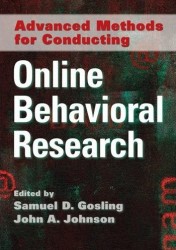Methods For Collecting Data
INTERNET METHODS
Since 1996 we have taken advantage of the Internet as a means for collecting data on personality and self-esteem. Data collected via the Internet is subject to limitations (e.g., obtaining data only from individuals with web access), this method also has a number of advantages (e.g., reaching well beyond the populations that characterize most psychological research; obtaining large sample sizes), especially when used in conjunction with conventional research methods.
The sample sizes we have been able to collect using internet techniques have permitted us to perform analyses and address questions that have hitherto remained unanswered. For example, in one study of personality development (Srivastava et al., 2003), the large number of participants (well over half a million) allowed us to test linear, quadratic, and cubic age trends as well as interactions between the trends and gender. Moreover, we have enough participants at each particular age to track trends in personality change with a high degree of fidelity (see e.g., Soto et al., 2008; Wood et al., 2007).
In a study of music preferences (Rentfrow & Gosling, 2003), we used the Internet to complement our self-report measures of music preferences collected here in Austin, Texas. The internet allowed us to obtain data on music preferences that was not dependent on self-reports and did not over-sample from a particular region of the United States. Specifically, we examined individuals’ on-line music libraries to obtain behaviorally revealed preferences from each of the 50 states.
EVALUATING INTERNET METHODS
Our more recent work focuses on evaluating the costs and benefits of Internet research methods (Buhrmester et al., 2011; Gosling & Mason, 2015; Gosling et al., 2004; ).
Amazon’s Mechanical Turk (MTurk)
If you’re interested in our work evaluating the validity of data gathered using MTurk, here’s our 2011 article published in Perspectives on Psychological Science (PoPS).
Michael Buhrmester, the lead author on our PoPS paper on MTurk, has prepared a very helpful “how to” guide for people who are considering collecting data via MTurk. You can get it at Michael’s webpage, which he’s constantly updating with news, links, and tips that should be of interest to anyone doing MTurk research. For questions/comments on the guide, please email Michael.
SOME ON-LINE TESTS WE’VE DEVELOPED
Click here to go to one of our on-line tests of the Big Five (or here, if you’d prefer feedback in terms of Star Wars characters!)
Click here to take a Big Five test in Spanish
Click here to take a Big Five test in German
Click here to take a Big Five test in Dutch
Click here to take a test that assesses your musical preferences
Are you thinking about doing internet research? If so, you need to buy this book by Chris Fraley. And when you’ve read that one, read this one:
And you should also check out the Web Survey Methodology site, a portal dedicated to methodological issues associated with web surveys.
